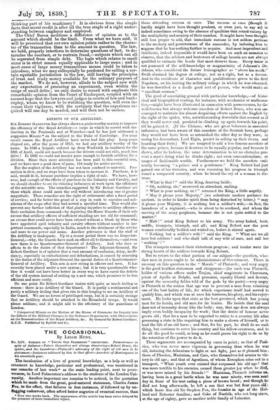DEFECTS OF OUR ARTILLERY.
Son Roismix GARDINER hes always shown a praiseworthy anxiety to improve the efficiency of the Royal Artillery—a corps in which he served with dis- tinction in the Peninsula and at Waterloo—and he has just addressed a suggestive Minutes on the subject to the Duke of Cambridge. For some occult reason the Royal Artillery have never bad fair play. Long years elapsed ere, after the peace of 1815, we had any artillery worthy of the name. In 1848 a brigade ordered up from Woolwich in readiness for the 10th of April, could not march because the drivers could not ride, much less drive ! In 1862 we could not muster guns enough to furnish artillery for a division. Since then more attention has been paid to this essential arm, and we have now a good show of guns, 118 ready for active service.
But the neglect of the Artillery has not been confined to material. Pro- motion is slow, and no steps have been taken to increase it. Purchase, it is said, would do it, because purchase implies a right of sale. We have, how- ever, had enough of the effects of purchase in the Infantry and Cavalry, and we should shudder to see its vitiating influences at work upon the efficiency of the scientific arm. The remedies suggested by Sir Robert Gardiner are those which alone could meet the evil without introducing one of greater magnitude. Those remedies are the right of retirement after a fixed period of service ; and far better the grant of a step in rank to captains and sub- alterns of the corps after they had served a specified time. This would also prevent any further infliction of that glaring injustice to artillery officers— their exclusion from command—by depriving the Horse Guards of their sole excuse that artillery officers of sufficient standing are too old for command ; an excuse that could never have been uttered without a blush by those who have appointed aged infantry and cavalry officers without number to im- portant commands, especially in India, much to the detriment of the service and more to our power and name. Another grievance is that the staff of the Artillery is inadequate. 17p to a recent period there was no Inspector- General,—why, the Guards have such an officer all to themselves,—and even now there is no Quartermaster-General of Artillery. And who does or affects to do the duties of that department ? The Adjutant-General. Sir Robert Gardiner is of opinion that a vast amount of confusion, delay, ineffi- ciency, especially in embarkations and debarkations, is caused by annexing to the duties of the Adjutant-General the special duties of a Quartermaster- General of Artillery. This arm is now strong in officers and men. It has recently been placed under a new system ; but it is very questionable whe- ther it would not have been better in every way to have cured the defects of the old system instead of setting up a new one, which promises to be less efficient and more costly.
On one point Sir Robert Gardiner insists with quite as much feeling as reason there is no Artillery of the Guard. It is partly a sentimental and partly a military feeling that gives rise to this longing to see an Artillery of the Guard. We are no lovers of privileged corps, but it is certainly strange -that no Artillery should be attached to the Household troops. It would please soldiers; and it might add to the efficiency of the guardians of London.
• Categorical Minute on the Motion of the House of Commons for Inquiry into the Effects of the Military Changes in the Ordnance Department, with Observations on the Reeonstruction of the Royal Artillery, &c. By General Sir Robert Gardiner, C.C.S. Published by Bylleld and Co.


























 Previous page
Previous page